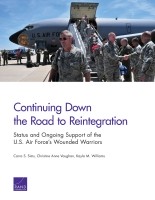| 来源类型 | Research Reports
|
| 规范类型 | 报告
|
| DOI | https://doi.org/10.7249/RR1474
|
| ISBN | 9780833094223
|
| 来源ID | RR-1474-AF
|
| Continuing Down the Road to Reintegration: Status and Ongoing Support of the U.S. Air Force's Wounded Warriors |
| Carra S. Sims; Christine Anne Vaughan; Kayla M. Williams
|
| 发表日期 | 2016
|
| 出版年 | 2016
|
| 页码 | 212
|
| 语种 | 英语
|
| 结论 |
Airmen in the Sample Experience Challenges in Several Domains- A high proportion of airmen surveyed screened positive for posttraumatic stress disorder (PTSD) and major depressive disorder (MDD), with 67 percent screening positive for both.
- They self-report lower rates of perceived physical health than the U.S. general population does.
- About half reported at least one instance in which they wanted but did not obtain mental health treatment.
- More than one-half of respondents identified their primary supporter as being a spouse or domestic partner, although about 20 percent said that no one played this role for them.
- About 10 percent of those surveyed fall below the U.S. Department of Health and Human Services' poverty guidelines.
- Close to 15 percent of the sample would be considered unemployed based on the Bureau of Labor Statistics' U3 (official) measure of unemployment.
- About 10 percent of the new cohort indicated that their first experience with housing instability occurred after they returned from most-recent deployment. About 8 percent of the longitudinal subset reported having experienced housing instability since the previous survey.
- However, some domains showed evidence of improvement. Between waves 1 and 2, airmen's perceptions of their physical impairments improved, the proportion of airmen who reported the presence of a primary supporter increased, and the proportion of airmen who were unemployed and looking for work decreased. Moreover, high numbers of respondents eligible for and in receipt of services from the varying programs available to support them reported overall very high levels of satisfaction with these programs.
|
| 摘要 |
- To help airmen overcome barriers to mental health treatment, AF (and other related systems of care) should continue to collect and publicize data on the quality of care provided, and evaluate new approaches to treating mental health problems; discuss availability and quality of care with airmen; evaluate, emphasize, and enhance confidential treatment options; pilot-test the efficacy of empowering nonmedical case managers to help address scheduling difficulties; and explore and facilitate social support interventions.
- To mitigate challenges that non–active duty respondents reported regarding employment and other types of nonmedical support, AF should explore specific reasons for this anxiety, and consider efficacy interventions focused on employment issues; focus employment support on individual skill sets and their translation to new contexts; continue systemizing and resourcing services to integrate social support generally, including the family liaison officers; and systematically assess how often airmen want nonmedical case managers to contact them.
|
| 主题 | Health Care Program Evaluation
; Posttraumatic Stress Disorder
; United States Air Force
; Veterans Health Care
|
| URL | https://www.rand.org/pubs/research_reports/RR1474.html
|
| 来源智库 | RAND Corporation (United States)
|
| 引用统计 |
|
| 资源类型 | 智库出版物
|
| 条目标识符 | http://119.78.100.153/handle/2XGU8XDN/108389
|
推荐引用方式
GB/T 7714 |
Carra S. Sims,Christine Anne Vaughan,Kayla M. Williams. Continuing Down the Road to Reintegration: Status and Ongoing Support of the U.S. Air Force's Wounded Warriors. 2016.
|
|
文件名:
|
x1509993463201.jpg
|
|
格式:
|
JPEG
|

|
文件名:
|
RAND_RR1474.pdf
|
|
格式:
|
Adobe PDF
|
除非特别说明,本系统中所有内容都受版权保护,并保留所有权利。